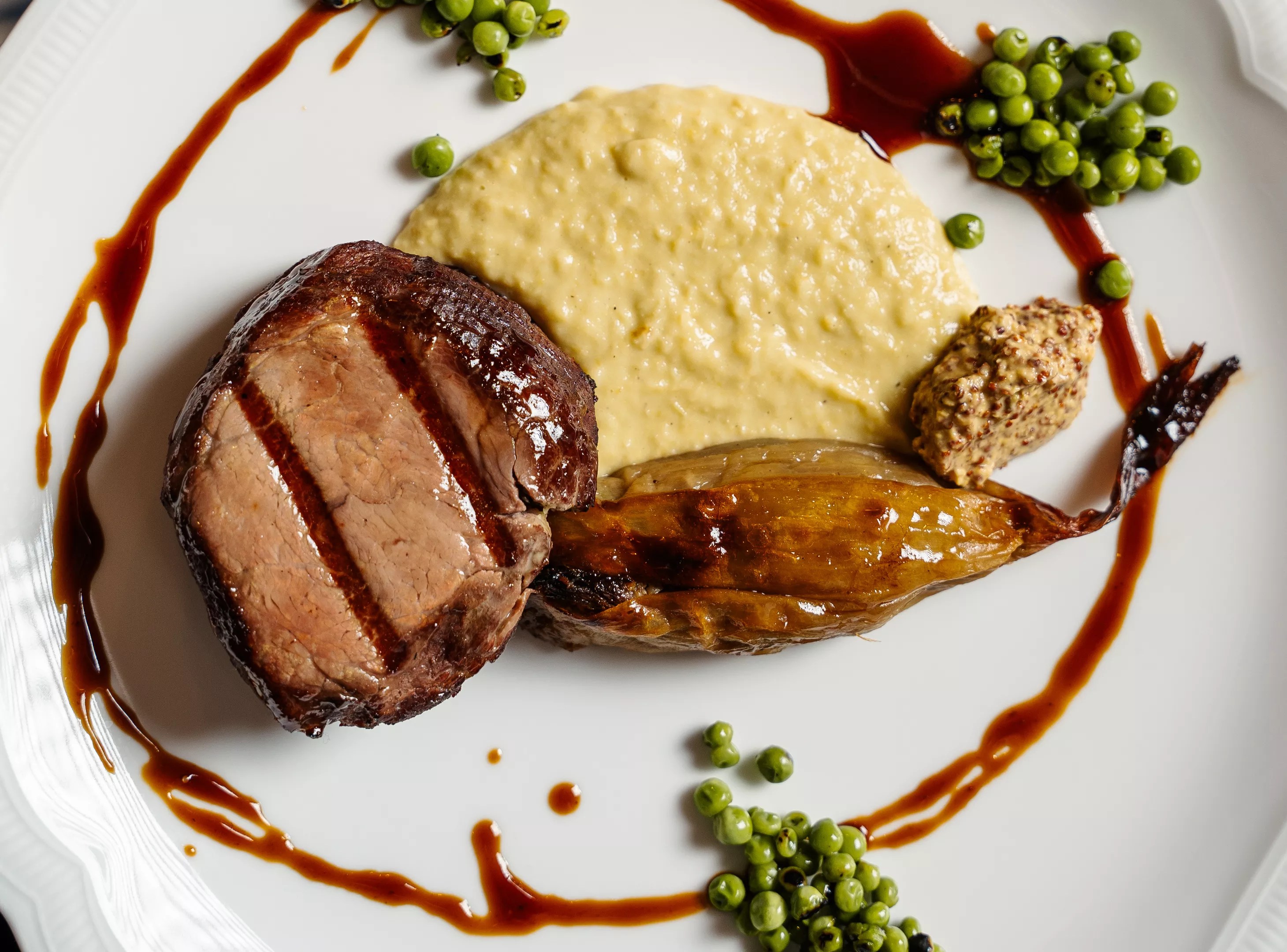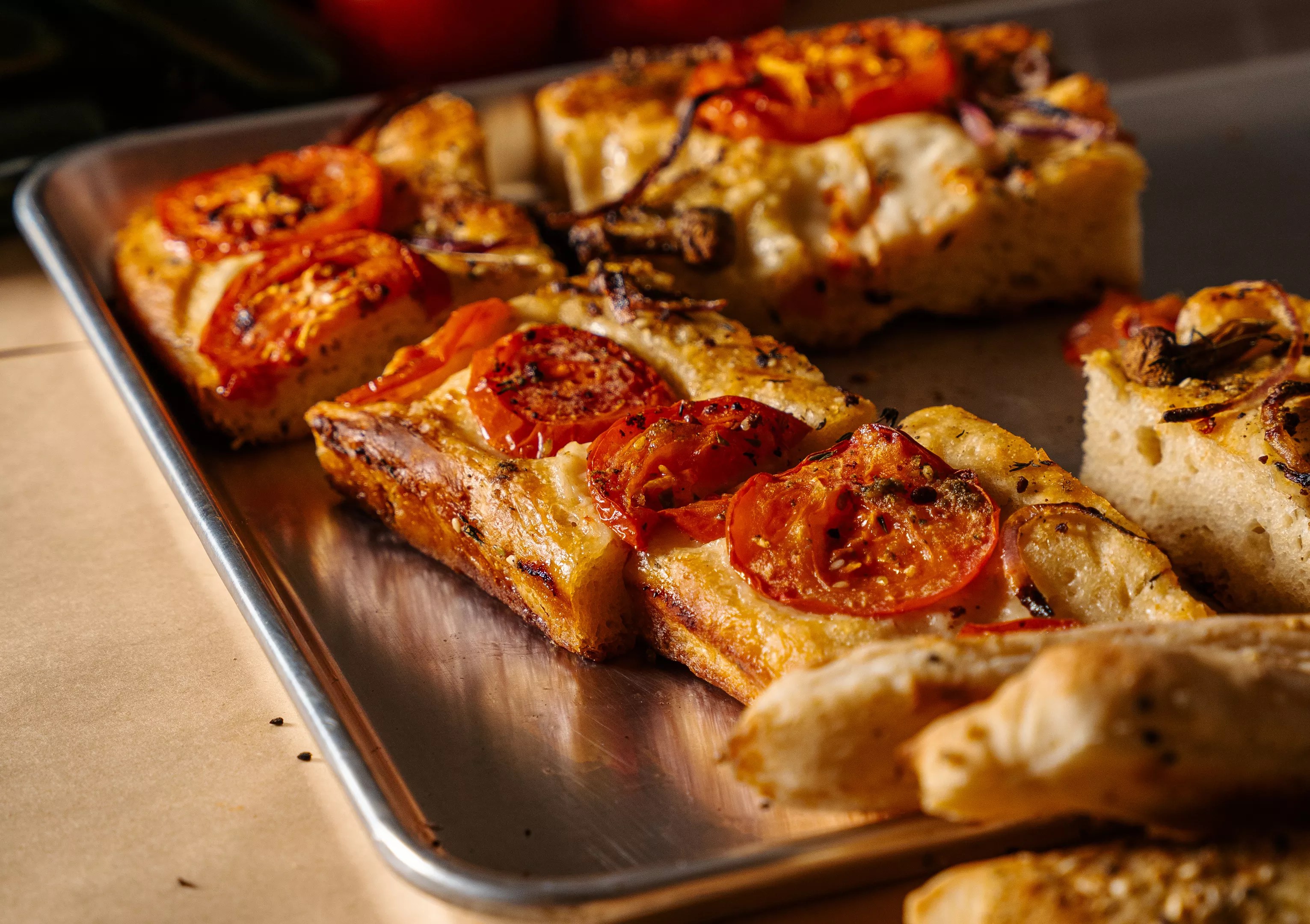
Photo by N.A. Photography

Audio By Carbonatix
Miami has long been a stronghold for kosher and Israeli dining, from no-frills falafel counters to sleek, modern take on Middle Eastern cuisine. The scene has only grown in recent years, with chefs riffing on tradition, folding in global influences, and reinterpreting the flavors of home. But Mutra, a 60-seat restaurant tucked away in North Miami, brings something different to the table – it’s a tribute to its founder’s family and beloved homeland.
Mutra is the latest restaurant from Israeli-born chef Raz Shabtai, whose career has spanned New York, Tel Aviv, and now South Florida. It isn’t just a restaurant-it’s a tribute. Named after Shabtai’s late grandmother, it’s a deeply personal reflection of family, memory, and a style of Israeli cooking that’s intimate, soulful, and full of heart.
“For Mutra, we’re taking the traditional dishes that we grew up on, food that my grandmother made and we ate as kids, and making something new from it,” Shabtai says. “What we will do at Mutra is honor the past but cook forward.” Shabtai describes his food as a modern interpretation of traditional Levantine, Galilean, and Baladi influences, culinary traditions that trace their roots to the cultural melting pot of his hometown, Jerusalem. “Food is holy,” he says, explaining his mission to bridge the past and present through inventive techniques and hyperlocal ingredients. At Mutra, the chef is rewriting the rules of kosher cuisine, eschewing outdated conventions in favor of a vibrant, globally inspired approach.

Mutra is the latest restaurant from Israeli-born chef Raz Shabtai, whose career has spanned New York, Tel Aviv, and now South Florida. It isn’t just a restaurant—it’s a tribute to his late grandmother
Photo by N.A. Photography
A Menu Without Borders and a Space Designed for Experience
Mutra’s menu defies easy categorization, much like Shabtai himself. He has taken childhood staples – dishes once lovingly prepared by his grandmother – and reconstructed them for the modern palate. Take, for example, his version of falafel. At Mutra, the “1 Perfect Falafel” is distilled to its essence: just one falafel croquette plated with tahi-amba, tomato gel, Israeli salad, and pickled red onion. Or the “Hamotze” (ha-mo-tze), a daily selection of house-baked bread, served with fresh, craft dips. Even chicken liver p’té gets a poetic upgrade, appearing on the menu as “Chicken Liver Dreaming to Become Foie Gras,” a dish balanced with silan date honey and pistachio crumble.
The “1000 Layers Steak” is a play on contrast, with tender beef stacked high and served with tahi-amba, a “burned salad,” and Anaheim hot pepper. “A Fisherman and a Farmer Walk Into the Kitchen” changes daily, built around silky hamachi sashimi and the freshest local farm ingredients Shabtai selects that day. Meanwhile, the “Uzbeki Seniya” reinterprets a traditional lamb kebab with har bracha tahini, sweet harissa, roasted red onion, and a vibrant tomato foam balanced by a Uzbeki apricot salad.
The restaurant’s desserts, crafted by pastry chef Stav Stephanie Hayun, evoke the flavors of the Middle East with dishes like Frishman Malabi, a delicate coconut custard laced with rose water and pistachio, and Katayef, a nod to traditional Yemeni pancakes, paired with lemon gelato and sumac.

Shabtai has his late beloved grandmother’s photograph displayed at Mutra
Photo by N.A. Photography
A Warm Dining Room to Compliment the Warmth of Each Dish
In terms of design, Mutra’s interior reflects the philosophy behind its cuisine: warm, inviting, yet forward-thinking. A large open kitchen sits at the heart of the 2,150-square-foot space, allowing diners to witness the action from any seat in the house. Enwrapped by a sleek bar that seats nearly two dozen guests, it offers an intimate view of the controlled chaos behind each dish. Line cooks move with precision, fire licking at cast-iron pans, knives gliding through herbs, and plating done with the kind of meticulous care that turns cooking into performance. It’s a front-row seat to the rhythm of the kitchen.
At the center of the dining room is a prominently displayed photograph of Mutra herself from her wedding day. “By putting my grandmother’s name on this restaurant, I am ensuring that there is no compromise, and I must perform at my best to deliver the most incredible experience I can – to live up to her memory and her cooking.”
It’s all part of Mutra’s immersive approach, where dishes tell stories, ingredients are sourced with care, and even the music, hand-selected by Shabtai, is designed to complement the experience. Every plate begins long before it reaches the table, starting at the farms that supply the restaurant with the freshest, most vibrant ingredients. Shabtai works closely with a network of trusted local growers to ensure that every bite reflects the season and the land. With a scratch kitchen that turns out meticulously plated yet deeply comforting food and a menu that often rotates nightly, no two visits to Mutra are ever quite the same.

With a scratch kitchen that turns out meticulously plated yet deeply comforting food and a menu that often rotates nightly, no two visits to Mutra are ever quite the same.
Photo by N.A. Photography
A New Era for Kosher Dining: Sustainable Farm-to-Table Ingredients
Shabtai’s path to opening Mutra wasn’t conventional. He has no formal culinary education, learning instead from years spent in kitchens – first beside his grandmother, then through a hands-on, trial-by-fire approach in some of Israel and New York’s most ambitious restaurants. After cutting his teeth at acclaimed spots like Nur, Alenbi, and Basta, he shifted gears to become a private chef. One of those clients, New York businessman Michael Werzberger, became so enamored with Shabtai’s cooking that he decided to invest in his vision. Another key player in Mutra’s inception is Noa Figari, a realtor who initially helped Shabtai find the restaurant space but quickly became a believer in his dream of opening a restaurant. She now runs the operations and business development for Gourmet Hospitality Group, the parent company behind Mutra.
Though Mutra is rooted in tradition, it’s not bound by it. Shabtai’s vision extends beyond simply offering kosher cuisine. He aims to redefine what that designation means. He focuses on high-quality, farm-to-table ingredients, prioritizing sustainability and seasonality.
On a recent evening at the restaurant, Shabtai welcomed guests with the kind of warmth that makes you feel less like a customer at a restaurant and more like a friend stepping into his home. His energy is infectious, setting the tone for a dining experience that feels personal, inviting, and deeply connected to the food on the table.
Later that night, a guest seated at the chef’s counter bar leaned in and asked, “How do you keep making the same dish over and over without losing focus?” The cook barely paused, flashing a knowing smile. “That’s what it means to be Israeli,” he says. “Everything we do is with passion and purpose.” The guest took another bite, nodding, “You can taste it. You can taste the love in every bite.”
Mutra. 2188 NE 123rd St., North Miami; 786-860-1213; mutramiami.com.